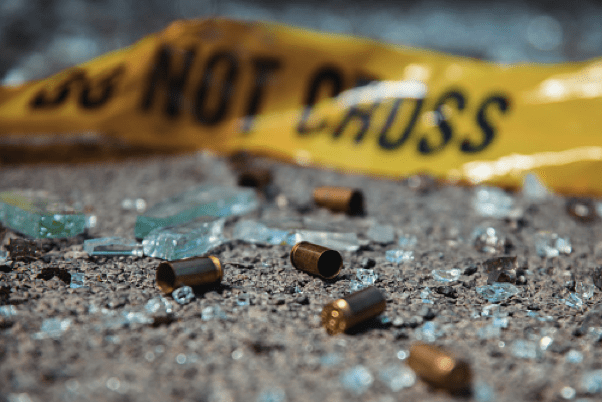
On Wednesday, September 29, the Institute for Human Rights at UAB welcomed Katie White, UAB Masters of Public Health student, to the Social Justice Café. Katie facilitated a discussion on gun violence and human rights.
Katie began by sharing that her research on gun violence in Birmingham emphasizes the intersections with public health and public health responsiveness. Katie shared statistical data on national rates of gun violence as well as in the state of Alabama. In the United States, there are an estimated 393 million guns — more guns than humans. Gun violence accounted for 961 deaths in the state of Alabama in 2020. The state of Alabama has the 5th highest death rate nationally, and there was a 15% increase in gun related homicides from 2010 to 2019.
Katie also discussed how the city of Birmingham is addressing the growing trend of gun related homicides. Birmingham has invested in various forms of technology such as; ShotSpotter, Predictive Policing, and a state-of-the-art real time crime center. The implementation of new technology is a step in the right direction, according to Katie; however, technology can be flawed and subject to bias and discrimination, especially against People of Color and people living in underserved communities. Additionally, the merger of traditional police work with new technology is inherently reactionary, creating a strong response whether than creating a strong deterrent.
Social Justice Café participants asked questions and shared their personal opinions. One participant asked Katie if she had any suggestions on how to minimize gun related homicides in the Birmingham. Based on her research, Katie suggests a three-point plan beginning with the implementation of economic development within disadvantaged communities that have historically lacked social mobility and access to opportunities. Next, Katie suggested the implementation of “Hospital Based Gun Violence Intervention (HBCVI).” HBCVI is initiated when a gunshot victim is admitted into a medical facility. Katie shared that “people who are most likely to commit gun violence are often likely to become victims of gun violence.” HBCVI is a proactive policy used to break the cyclical nature of gun violence. The victim will be offered social assistance in the form of social workers and a police officer. It will be the responsibility of the police officer to gather obtain information to locate the perpetrator of violence. It will be the responsibility of the social worker to administer much needed support to the victim as they journey down the road to physical and mental recovery. The implementation of HBGVI could solve a plethora of social injustices. The neglect experienced in underserved communities tends to manifest in the form of violence and mental health deterioration. HBGVI can address violence within underserved communities, as well as administer much needed mental health support during moments of extreme stress. Finally, Katie suggests the City of Birmingham create conflict resolution courses to be taught within communities as well as in the classroom. Arming citizens with healthy conflict resolution skills, instead of firearms, will better prepare citizens to avoid conflict.
After a robust discussion, varying in topics ranging from public health initiatives to community building, Katie offered a final sentiment: “Gun violence is a complex issue and requires a complex solution.” It is the responsibility of everyone to prioritize institutional response to the escalating threat of gun violence.
Thank you, Katie White and thank you everyone who participated in this wonderful discussion. Our next Social Justice Café will be held on Wednesday, October 13, and we will be discussing vaccine mandates and human rights with Dr. Suzanne Judd. Everyone is welcome. Register here!
To see more upcoming events hosted by the Institute for Human Rights at UAB, please visit our events page here.
